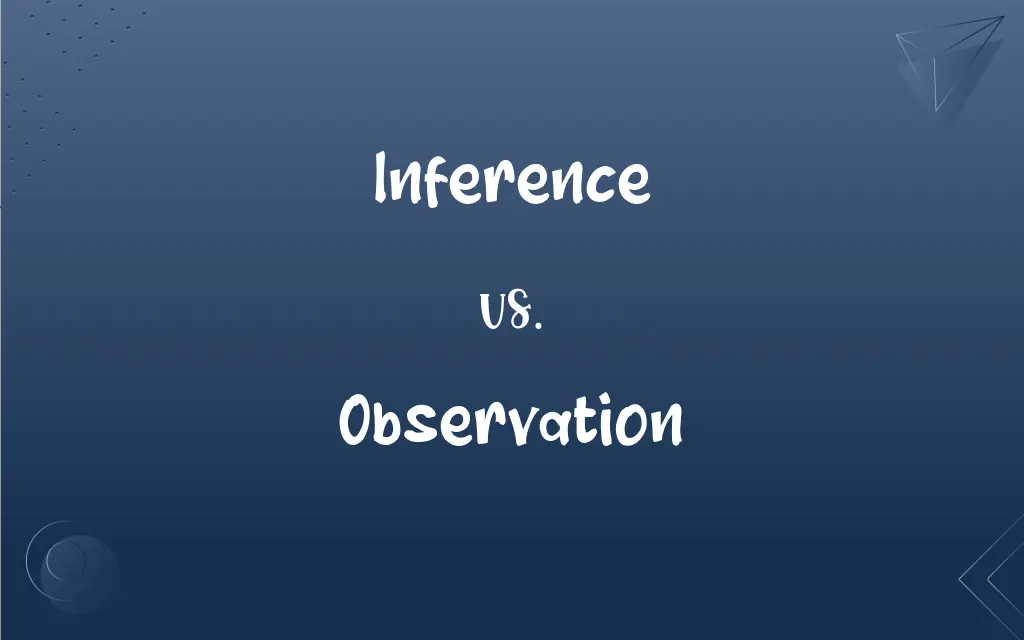Inference vs. Observation: What's the Difference?
Edited by Janet White || By Harlon Moss || Updated on October 23, 2023
An inference is a conclusion drawn from data or evidence, while an observation is a direct and immediate perception of facts or events.

Key Differences
An inference refers to a reasoned conclusion based on evidence, while an observation is the act of noticing or perceiving something directly.
Making an inference often requires analysis and interpretation of data or evidence, whereas an observation is a straightforward act of using one's senses to gather information.
Inference can be influenced by one's beliefs or previous knowledge, leading to subjectivity. An observation, on the other hand, aims to be objective, focusing on what is directly perceivable.
An inference can be used to predict future events based on current evidence. An observation, in contrast, deals with present facts and events without predicting the future.
Inferences play a crucial role in decision-making and problem-solving, while observations are key in data collection and initial stages of investigation.
ADVERTISEMENT
Comparison Chart
Nature
Conclusion based on evidence.
Direct perception of facts or events.
Process
Requires analysis and interpretation.
Straightforward use of senses.
Subjectivity
Can be subjective, influenced by beliefs.
Aims to be objective.
Temporality
Can predict future events.
Deals with present facts and events.
Role in Research
Helps in decision-making and problem-solving.
Key in data collection and initial investigation.
ADVERTISEMENT
Inference and Observation Definitions
Inference
An assumption made based on specific evidence.
From the wet ground, he made the inference that it had rained.
Observation
A remark or statement based on what one has noticed.
His observation about the play was insightful.
Inference
A judgment or guess that is based on information.
Seeing the empty box, the inference was that the cake was eaten.
Observation
A direct perception using the senses.
The bright colors were immediately noticeable upon observation.
Inference
A logical interpretation based on prior knowledge.
Given the dark clouds, his inference was a storm approaching.
Observation
The act of noticing or detecting phenomena.
Her observation of the bird's behavior was meticulous.
Inference
An educated guess derived from observations or evidence.
The inference from the data was that sales increased in December.
Observation
A factual record of an event or occurrence.
The observation log recorded each meteor sighting.
Inference
A deduction or conclusion derived from reasoning.
Her tears were an inference of her sadness.
Observation
The process of monitoring or watching.
The scientist's observation lasted several hours.
Inference
The act or process of deriving logical conclusions from premises known or assumed to be true.
Observation
The act of observing
Observations of a rare bird.
FAQs
What does "inference" mean?
Inference is a conclusion or deduction made based on evidence and reasoning.
Is inference an observation?
No, inference is a conclusion drawn from observations or evidence, rather than a direct observation itself.
How is inference used in daily life?
We often make inferences to understand situations or predict outcomes, such as inferring someone's mood from their facial expression.
How do scientists use inference?
Scientists use inference to develop hypotheses or theories based on observed data.
Can an observation be both qualitative and quantitative?
Yes, for instance, observing that "the apple is red (qualitative) and weighs 150 grams (quantitative)."
Are all inferences based on observations?
Not necessarily. Inferences can also be based on other inferences, known facts, or general knowledge.
What is a qualitative observation?
A qualitative observation describes qualities or characteristics without using numbers, e.g., "the sky is blue."
How does personal bias affect observation?
Personal biases can influence what one notices, how they interpret what they see, and even the details they recall.
What is a logical inference?
A logical inference is a conclusion drawn from premises using the principles of logic.
How does observation differ from inference?
Observation is about directly noticing or perceiving, while inference involves drawing conclusions based on observations.
How do scientists use observations?
Scientists gather observations as data to test hypotheses, develop theories, and understand natural phenomena.
What tools aid in making observations?
Instruments like telescopes, microscopes, and thermometers can enhance or quantify human observations.
Why is inference important?
It allows us to draw conclusions and make predictions based on available information.
Is inference subjective?
To some extent, yes. Different individuals can draw different inferences from the same set of observations.
What does "observation" mean?
Observation refers to the act of noticing or perceiving something directly, usually through the senses.
Is observation always accurate?
No, observations can be influenced by biases, misconceptions, or limitations of the senses.
Why are observations crucial in research?
Observations provide the foundational data and evidence upon which scientific understanding and conclusions are built.
What's the difference between an inference and a guess?
An inference is based on evidence and reasoning, whereas a guess might not have a solid foundation.
What is a quantitative observation?
A quantitative observation involves measurement and produces data that can be expressed in numbers, e.g., "the water is 25°C."
Can an inference be incorrect?
Yes, inferences can be incorrect if based on faulty reasoning or incomplete evidence.
About Author
Written by
Harlon MossHarlon is a seasoned quality moderator and accomplished content writer for Difference Wiki. An alumnus of the prestigious University of California, he earned his degree in Computer Science. Leveraging his academic background, Harlon brings a meticulous and informed perspective to his work, ensuring content accuracy and excellence.
Edited by
Janet WhiteJanet White has been an esteemed writer and blogger for Difference Wiki. Holding a Master's degree in Science and Medical Journalism from the prestigious Boston University, she has consistently demonstrated her expertise and passion for her field. When she's not immersed in her work, Janet relishes her time exercising, delving into a good book, and cherishing moments with friends and family.































































